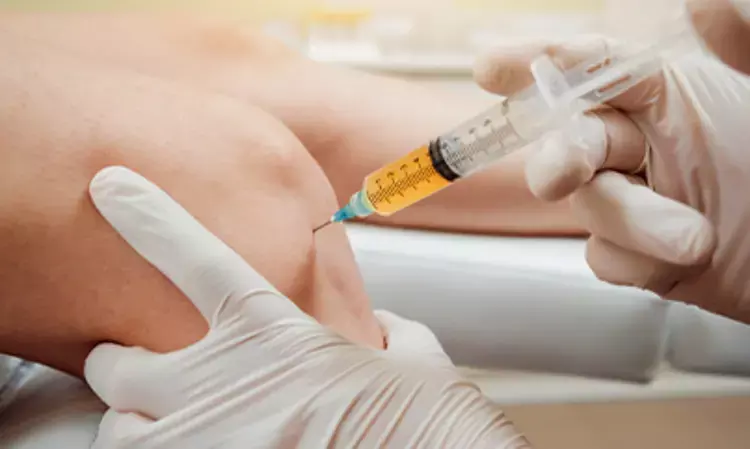- Home
- Medical news & Guidelines
- Anesthesiology
- Cardiology and CTVS
- Critical Care
- Dentistry
- Dermatology
- Diabetes and Endocrinology
- ENT
- Gastroenterology
- Medicine
- Nephrology
- Neurology
- Obstretics-Gynaecology
- Oncology
- Ophthalmology
- Orthopaedics
- Pediatrics-Neonatology
- Psychiatry
- Pulmonology
- Radiology
- Surgery
- Urology
- Laboratory Medicine
- Diet
- Nursing
- Paramedical
- Physiotherapy
- Health news
- Fact Check
- Bone Health Fact Check
- Brain Health Fact Check
- Cancer Related Fact Check
- Child Care Fact Check
- Dental and oral health fact check
- Diabetes and metabolic health fact check
- Diet and Nutrition Fact Check
- Eye and ENT Care Fact Check
- Fitness fact check
- Gut health fact check
- Heart health fact check
- Kidney health fact check
- Medical education fact check
- Men's health fact check
- Respiratory fact check
- Skin and hair care fact check
- Vaccine and Immunization fact check
- Women's health fact check
- AYUSH
- State News
- Andaman and Nicobar Islands
- Andhra Pradesh
- Arunachal Pradesh
- Assam
- Bihar
- Chandigarh
- Chattisgarh
- Dadra and Nagar Haveli
- Daman and Diu
- Delhi
- Goa
- Gujarat
- Haryana
- Himachal Pradesh
- Jammu & Kashmir
- Jharkhand
- Karnataka
- Kerala
- Ladakh
- Lakshadweep
- Madhya Pradesh
- Maharashtra
- Manipur
- Meghalaya
- Mizoram
- Nagaland
- Odisha
- Puducherry
- Punjab
- Rajasthan
- Sikkim
- Tamil Nadu
- Telangana
- Tripura
- Uttar Pradesh
- Uttrakhand
- West Bengal
- Medical Education
- Industry
Use of intra-articular vancomycin safe in primary hip and knee arthroplasty

The use of a single dose of intra-articular antibiotic (IAA) has been reported in reducing the rate of prosthetic joint injection after total hip and knee arthroplasty. A.W.R. Burns et al examined the safety of IAA in primary hip and knee replacement surgery and the blood levels and joint fluid levels of vancomycin utilising this technique. It has been published in “Journal of Orthopaedics.”
From August to October 2021, 68 patients undergoing primary total joint arthroplasty (THA & TKA) were given 1g vancomycin intra-articularly (IA) after closure of the fascia. All patients received 2g cefazolin intravenously (IV) 30 min prior to the procedure as is the standard prophylaxis, and 21 of the patients (IA + IV) were also administered an additional 1 gm vancomycin IV. Post-operative blood vancomycin, creatinine and eGFR level monitoring was performed day1 and day3. To determine the post-operative intra-articular vancomycin levels, surgical drain fluid was sampled at day 1 and 2, in 10 patients.
Key findings of the study were:
• In the group where vancomycin was injected after fascial closure, the average blood vancomycin level day 1 was 5.2 μg/ml (range 2.0–10.9) and day 3 was < 1.4 μg/ml.
• The average pre-op creatinine levels were 69.4 μmol/L (56.1–82.6) compared to 70.2 μmol/L (57.0–83.4) on day 1 and 66.1 μmol/L (52.6–79.6) on day 3, (p = 0.663).
• The average pre-op eGFR levels (ml/ min/1.73 m2) were 82.2 (76.0–88.3) compared to 81.7 (75.6–87.8) on day 1 and 83.0 (76.8–89.2) on day 3 (p = 0.736).
• Samples of joint fluid aspirated from surgical drains on day 1 and day 2 showed average vancomycin levels of 224 μg/ml and 51 μg/ml respectively, significantly higher than the MIC for Staph aureus.
The authors concluded that – “The use of IA vancomycin in TJA is appears safe, providing high antibiotic levels within the joint itself, with no renal or auditory complications in our investigation. Whilst role of IA antibiotics is evolving and its position in total joint replacement has not yet been fully determined, these finding may stimulate further study in this area of clearly significant importance in the prevention of PJI.”
Further reading:
The use of intra-articular vancomycin is safe in primary hip and knee arthroplasty Alexander W.R. Burns, Tat Chao et al Journal of Orthopaedics 46 (2023) 161–163 https://doi.org/10.1016/j.jor.2023.10.017
MBBS, Dip. Ortho, DNB ortho, MNAMS
Dr Supreeth D R (MBBS, Dip. Ortho, DNB ortho, MNAMS) is a practicing orthopedician with interest in medical research and publishing articles. He completed MBBS from mysore medical college, dip ortho from Trivandrum medical college and sec. DNB from Manipal Hospital, Bengaluru. He has expirence of 7years in the field of orthopedics. He has presented scientific papers & posters in various state, national and international conferences. His interest in writing articles lead the way to join medical dialogues. He can be contacted at editorial@medicaldialogues.in.
Dr Kamal Kant Kohli-MBBS, DTCD- a chest specialist with more than 30 years of practice and a flair for writing clinical articles, Dr Kamal Kant Kohli joined Medical Dialogues as a Chief Editor of Medical News. Besides writing articles, as an editor, he proofreads and verifies all the medical content published on Medical Dialogues including those coming from journals, studies,medical conferences,guidelines etc. Email: drkohli@medicaldialogues.in. Contact no. 011-43720751


